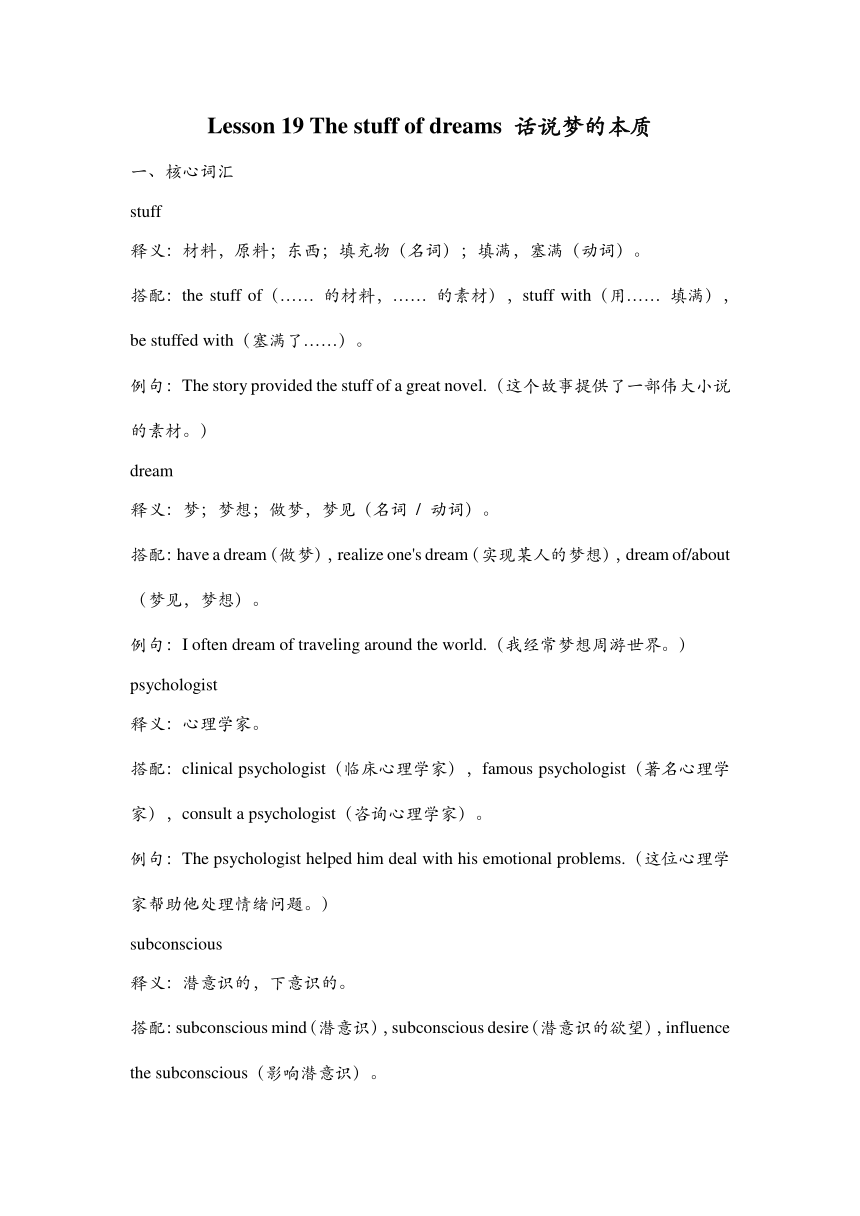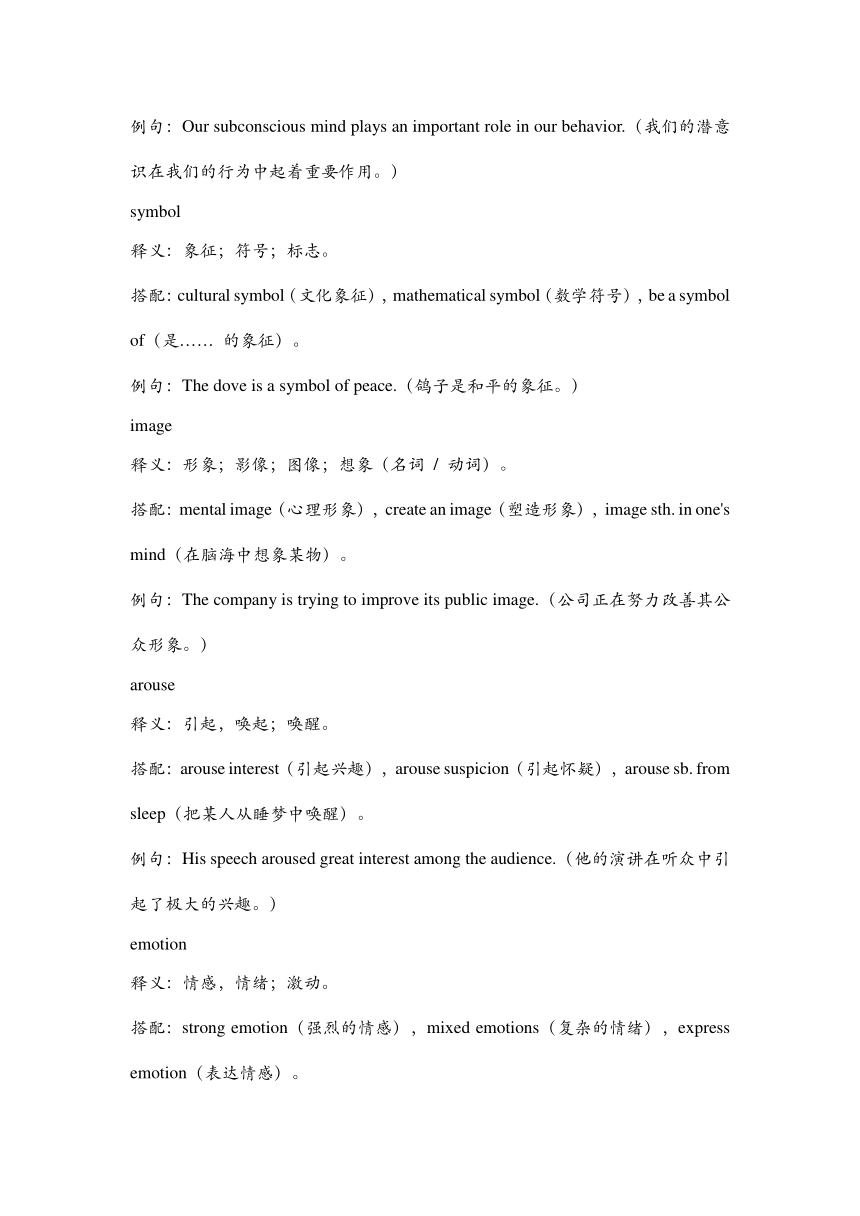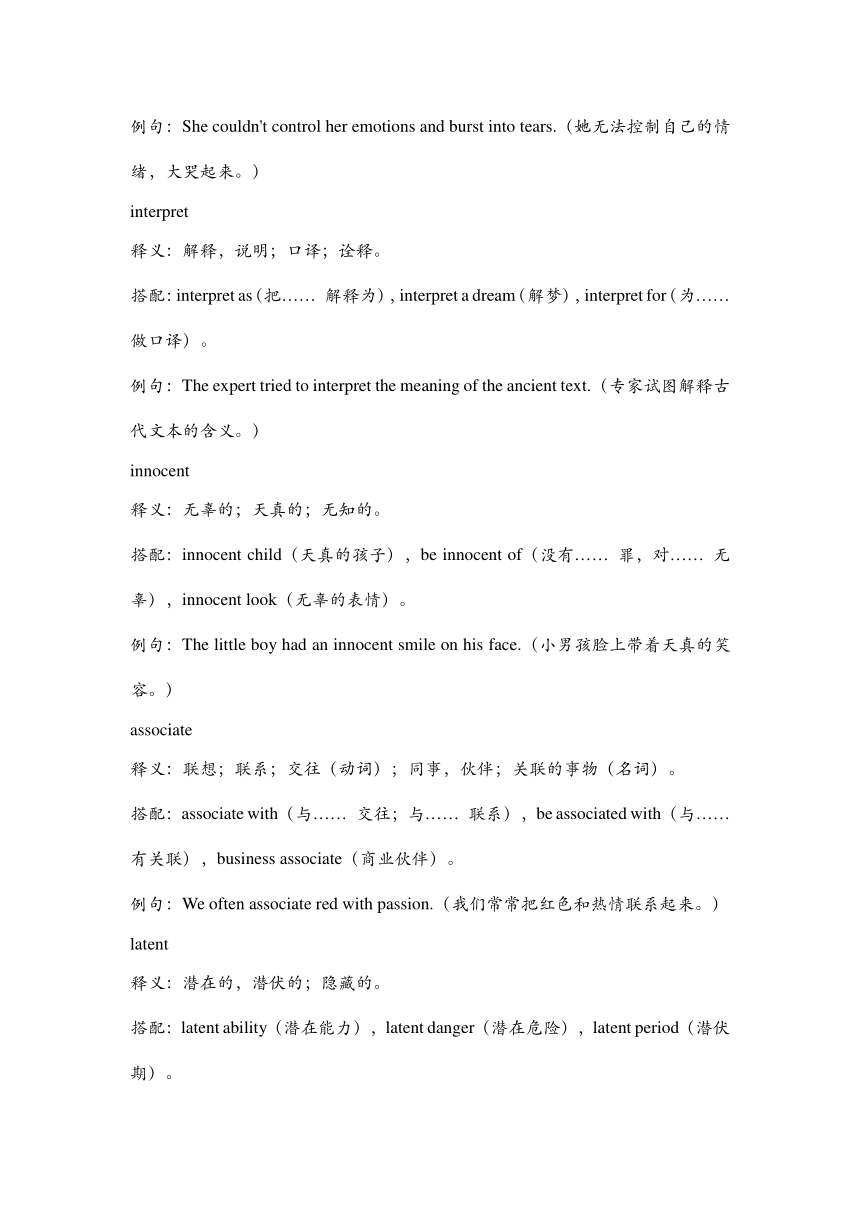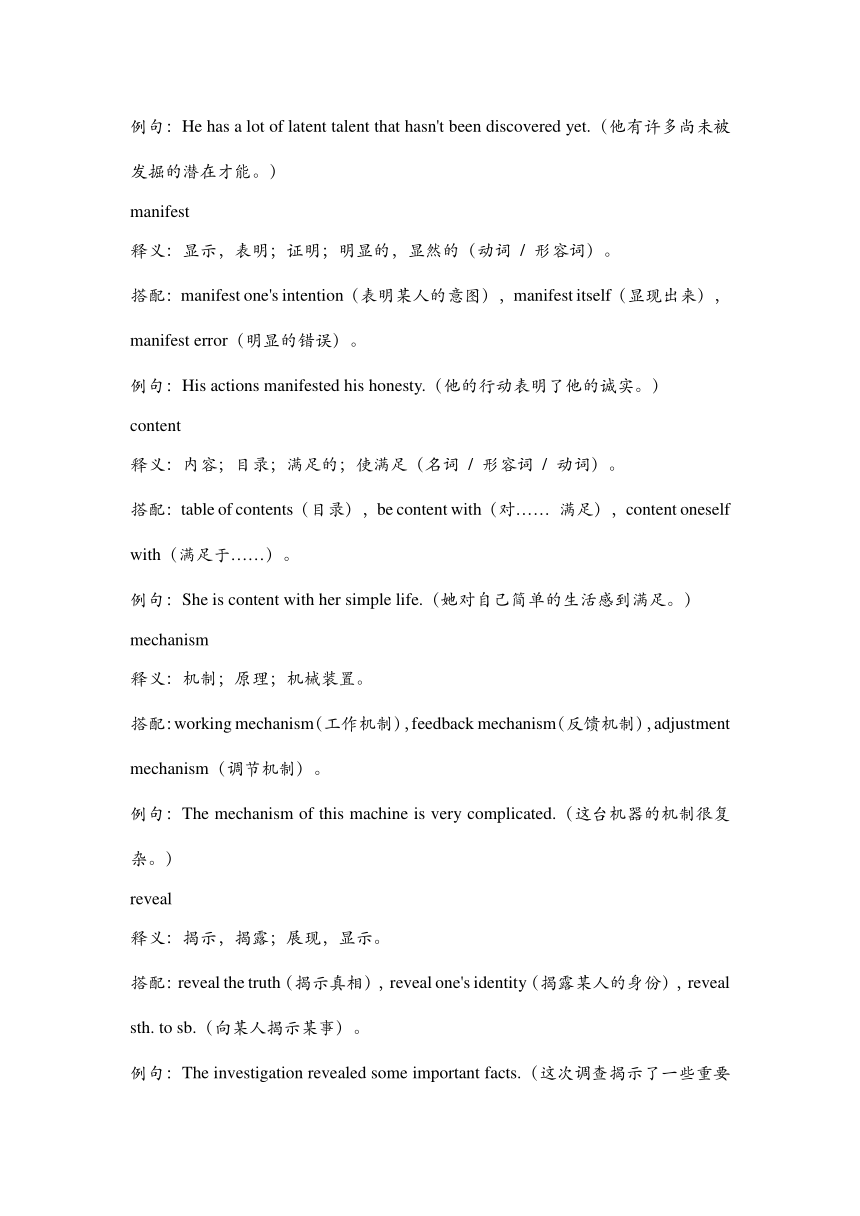2024-2025学年新概念英语第三册Lesson19 A very dear cat The stuff of dreams话说梦的本质讲义
文档属性
| 名称 | 2024-2025学年新概念英语第三册Lesson19 A very dear cat The stuff of dreams话说梦的本质讲义 |  | |
| 格式 | docx | ||
| 文件大小 | 24.5KB | ||
| 资源类型 | 教案 | ||
| 版本资源 | 新概念英语 | ||
| 科目 | 英语 | ||
| 更新时间 | 2024-12-29 20:33:10 | ||
图片预览




文档简介
Lesson 19 The stuff of dreams 话说梦的本质
核心词汇
stuff
释义:材料,原料;东西;填充物(名词);填满,塞满(动词)。
搭配:the stuff of(…… 的材料,…… 的素材),stuff with(用…… 填满),be stuffed with(塞满了……)。
例句:The story provided the stuff of a great novel.(这个故事提供了一部伟大小说的素材。)
dream
释义:梦;梦想;做梦,梦见(名词 / 动词)。
搭配:have a dream(做梦),realize one's dream(实现某人的梦想),dream of/about(梦见,梦想)。
例句:I often dream of traveling around the world.(我经常梦想周游世界。)
psychologist
释义:心理学家。
搭配:clinical psychologist(临床心理学家),famous psychologist(著名心理学家),consult a psychologist(咨询心理学家)。
例句:The psychologist helped him deal with his emotional problems.(这位心理学家帮助他处理情绪问题。)
subconscious
释义:潜意识的,下意识的。
搭配:subconscious mind(潜意识),subconscious desire(潜意识的欲望),influence the subconscious(影响潜意识)。
例句:Our subconscious mind plays an important role in our behavior.(我们的潜意识在我们的行为中起着重要作用。)
symbol
释义:象征;符号;标志。
搭配:cultural symbol(文化象征),mathematical symbol(数学符号),be a symbol of(是…… 的象征)。
例句:The dove is a symbol of peace.(鸽子是和平的象征。)
image
释义:形象;影像;图像;想象(名词 / 动词)。
搭配:mental image(心理形象),create an image(塑造形象),image sth. in one's mind(在脑海中想象某物)。
例句:The company is trying to improve its public image.(公司正在努力改善其公众形象。)
arouse
释义:引起,唤起;唤醒。
搭配:arouse interest(引起兴趣),arouse suspicion(引起怀疑),arouse sb. from sleep(把某人从睡梦中唤醒)。
例句:His speech aroused great interest among the audience.(他的演讲在听众中引起了极大的兴趣。)
emotion
释义:情感,情绪;激动。
搭配:strong emotion(强烈的情感),mixed emotions(复杂的情绪),express emotion(表达情感)。
例句:She couldn't control her emotions and burst into tears.(她无法控制自己的情绪,大哭起来。)
interpret
释义:解释,说明;口译;诠释。
搭配:interpret as(把…… 解释为),interpret a dream(解梦),interpret for(为…… 做口译)。
例句:The expert tried to interpret the meaning of the ancient text.(专家试图解释古代文本的含义。)
innocent
释义:无辜的;天真的;无知的。
搭配:innocent child(天真的孩子),be innocent of(没有…… 罪,对…… 无辜),innocent look(无辜的表情)。
例句:The little boy had an innocent smile on his face.(小男孩脸上带着天真的笑容。)
associate
释义:联想;联系;交往(动词);同事,伙伴;关联的事物(名词)。
搭配:associate with(与…… 交往;与…… 联系),be associated with(与…… 有关联),business associate(商业伙伴)。
例句:We often associate red with passion.(我们常常把红色和热情联系起来。)
latent
释义:潜在的,潜伏的;隐藏的。
搭配:latent ability(潜在能力),latent danger(潜在危险),latent period(潜伏期)。
例句:He has a lot of latent talent that hasn't been discovered yet.(他有许多尚未被发掘的潜在才能。)
manifest
释义:显示,表明;证明;明显的,显然的(动词 / 形容词)。
搭配:manifest one's intention(表明某人的意图),manifest itself(显现出来),manifest error(明显的错误)。
例句:His actions manifested his honesty.(他的行动表明了他的诚实。)
content
释义:内容;目录;满足的;使满足(名词 / 形容词 / 动词)。
搭配:table of contents(目录),be content with(对…… 满足),content oneself with(满足于……)。
例句:She is content with her simple life.(她对自己简单的生活感到满足。)
mechanism
释义:机制;原理;机械装置。
搭配:working mechanism(工作机制),feedback mechanism(反馈机制),adjustment mechanism(调节机制)。
例句:The mechanism of this machine is very complicated.(这台机器的机制很复杂。)
reveal
释义:揭示,揭露;展现,显示。
搭配:reveal the truth(揭示真相),reveal one's identity(揭露某人的身份),reveal sth. to sb.(向某人揭示某事)。
例句:The investigation revealed some important facts.(这次调查揭示了一些重要事实。)
unconscious
释义:无意识的;失去知觉的;未察觉的。
搭配:unconscious mind(无意识的心理),fall unconscious(失去知觉),be unconscious of(未察觉到……)。
例句:He was knocked unconscious in the accident.(他在事故中被撞得失去了知觉。)
fantasy
释义:幻想,空想;幻想作品;想象。
搭配:live in a fantasy(生活在幻想中),build a fantasy(构建幻想),fantasy world(幻想世界)。
例句:Children often have wonderful fantasies.(孩子们常常有奇妙的幻想。)
daydream
释义:白日梦;幻想,空想(名词 / 动词)。
搭配:indulge in daydreams(沉溺于白日梦),have a daydream(做白日梦),daydream about(幻想……)。
例句:She sat there, daydreaming about her future.(她坐在那里,幻想着自己的未来。)
realm
释义:领域,范围;王国,国度。
搭配:in the realm of(在…… 领域),spiritual realm(精神领域),political realm(政治领域)。
例句:His research is in the realm of modern physics.(他的研究属于现代物理学领域。)
二、课文
1. 文章内容解读
课文围绕梦的本质这一主题展开。先是提到心理学家对梦的研究,指出梦与潜意识相关,梦里出现的各种象征、形象等可能反映了人们潜意识中的情感、欲望或想法等内容。接着阐述了解梦的不同方式以及梦所蕴含的潜在意义,比如有些梦可能唤起人们内心潜在的情绪,不同的元素在梦中有着不同的象征意味,需要通过合理的解释去理解它们。还探讨了梦形成的机制以及梦在揭示人们内心世界,无论是无意识的想法还是隐藏的愿望等方面所起到的作用,整体呈现出梦这一复杂且神秘的心理现象的多面性。
2. 重点句型讲解
“One theory is that we dream to release the deep, hidden emotions from our subconscious, and that these emotions are so powerful that if we don't express them in our dreams, they will find a way to manifest themselves in our behavior.”(一种理论认为,我们做梦是为了释放深藏在潜意识中的情感,而且这些情感非常强烈,如果我们不在梦中表达它们,它们就会设法在我们的行为中表现出来。)
讲解:此句中 “that we dream to release the deep, hidden emotions from our subconscious” 和 “that these emotions are so powerful that if we don't express them in our dreams, they will find a way to manifest themselves in our behavior” 是两个并列的表语从句,作 “is” 的表语,共同阐述了一种关于做梦原因及相关影响的理论;在第二个表语从句中,又包含了 “so...that...” 引导的结果状语从句 “these emotions are so powerful that if we don't express them in our dreams, they will find a way to manifest themselves in our behavior”,以及 “if” 引导的条件状语从句 “if we don't express them in our dreams”,通过这种多重从句的嵌套使用,使句子能够详细且有条理地表达复杂的理论内容,清晰地呈现出梦与潜意识情感之间的关系。
“It is only when we are in a deep sleep that our bodies are completely relaxed and our subconscious minds can start to work on the stuff of dreams.”(只有在我们熟睡时,我们的身体才会完全放松,我们的潜意识才能开始处理梦的素材。)
讲解:此句是一个强调句结构,其基本结构为 “It is + 被强调部分 + that + 其他部分”,在这里强调的是时间状语 “when we are in a deep sleep”,通过这种强调句的运用,突出了熟睡这个特定状态对于潜意识处理梦的素材的重要性,使读者能更清晰地把握梦产生的关键条件,强调句在英语中常用于突出句子中的某个重要成分,增强表达的重点和语气。
三、语法
1. 表语从句
定义:表语从句是在复合句中作表语的从句,位于系动词(如 be、seem、look、become 等)之后,其功能相当于一个名词,用来解释说明主语的内容、性质、特征等情况。
用法:例如:The problem is that we don't have enough time.(问题是我们没有足够的时间。)这里 “that we don't have enough time” 就是表语从句,说明 “the problem” 具体是什么情况;又如:Her dream is that she can become a famous singer.(她的梦想是她能成为一名著名的歌手。)“that she can become a famous singer” 对 “her dream” 进行解释说明。表语从句通常由 that、whether、连接代词(如 what、who 等)或连接副词(如 when、where、why 等)引导。
例句:The fact is that he has already left.(事实是他已经离开了。)
2. 强调句
定义:强调句是一种用来突出句子中某个重要成分(如主语、宾语、状语等)的句式结构,其基本句型是 “It is/was + 被强调部分 + that/who + 其他部分”,如果被强调的部分是人,可用 who 代替 that,强调句的特点是去掉 “It is/was...that/who...” 后,句子依然完整且意思不变。
用法:例如:It was Tom who helped me yesterday.(昨天是汤姆帮助了我。)这里强调的是主语 “Tom”;又如:It is in the classroom that we have classes.(我们是在教室里上课的。)强调的是地点状语 “in the classroom”。通过使用强调句可以使要强调的内容更加醒目,增强语言的表现力。
例句:It was because of his hard work that he succeeded.(正是由于他的辛勤工作,他才取得了成功。)
四、单句语法填空
The story provided good ______ (stuff) for a movie script.(答案:stuff,“stuff” 作 “材料,素材” 讲时是不可数名词,此处用原形即可)
She often ______ (dream) of becoming a famous writer.(答案:dreams,根据句中的 “often” 可知此处应用一般现在时,主语 “She” 是第三人称单数,所以动词用第三人称单数形式 “dreams”)
The psychologist tried to ______ (interpret) the meaning of his dreams.(答案:interpret,“try to do sth.” 是固定用法,意为 “试图做某事”,所以此处用动词原形)
The dove is a well-known ______ (symbol) of peace.(答案:symbol,根据前面的不定冠词 “a” 可知此处用名词单数形式)
His words ______ (arouse) my curiosity and I wanted to know more.(答案:aroused,根据句中的 “wanted” 可知此处描述过去发生的事情,应用一般过去时,“arouse” 的过去式为 “aroused”)
He has a lot of ______ (latent) talent that hasn't been developed yet.(答案:latent,此处用形容词修饰名词 “talent”,“latent” 表示 “潜在的”)
The results of the experiment ______ (reveal) some interesting phenomena.(答案:revealed,根据语境可知此处描述过去发生的事情,应用一般过去时,“reveal” 的过去式为 “revealed”)
She was so tired that she fell ______ (unconscious) on the sofa.(答案:unconscious,“fall” 在这里是系动词,后接形容词作表语,“unconscious” 表示 “失去知觉的”)
Children often have vivid ______ (fantasy) in their minds.(答案:fantasies,根据前面的 “have” 以及主语 “Children” 可知此处应用名词复数形式,“fantasies” 表示 “幻想”)
His research mainly focuses on the ______ (realm) of psychology.(答案:realm,“in the realm of” 是固定搭配,表示 “在…… 领域”,此处用名词形式)
核心词汇
stuff
释义:材料,原料;东西;填充物(名词);填满,塞满(动词)。
搭配:the stuff of(…… 的材料,…… 的素材),stuff with(用…… 填满),be stuffed with(塞满了……)。
例句:The story provided the stuff of a great novel.(这个故事提供了一部伟大小说的素材。)
dream
释义:梦;梦想;做梦,梦见(名词 / 动词)。
搭配:have a dream(做梦),realize one's dream(实现某人的梦想),dream of/about(梦见,梦想)。
例句:I often dream of traveling around the world.(我经常梦想周游世界。)
psychologist
释义:心理学家。
搭配:clinical psychologist(临床心理学家),famous psychologist(著名心理学家),consult a psychologist(咨询心理学家)。
例句:The psychologist helped him deal with his emotional problems.(这位心理学家帮助他处理情绪问题。)
subconscious
释义:潜意识的,下意识的。
搭配:subconscious mind(潜意识),subconscious desire(潜意识的欲望),influence the subconscious(影响潜意识)。
例句:Our subconscious mind plays an important role in our behavior.(我们的潜意识在我们的行为中起着重要作用。)
symbol
释义:象征;符号;标志。
搭配:cultural symbol(文化象征),mathematical symbol(数学符号),be a symbol of(是…… 的象征)。
例句:The dove is a symbol of peace.(鸽子是和平的象征。)
image
释义:形象;影像;图像;想象(名词 / 动词)。
搭配:mental image(心理形象),create an image(塑造形象),image sth. in one's mind(在脑海中想象某物)。
例句:The company is trying to improve its public image.(公司正在努力改善其公众形象。)
arouse
释义:引起,唤起;唤醒。
搭配:arouse interest(引起兴趣),arouse suspicion(引起怀疑),arouse sb. from sleep(把某人从睡梦中唤醒)。
例句:His speech aroused great interest among the audience.(他的演讲在听众中引起了极大的兴趣。)
emotion
释义:情感,情绪;激动。
搭配:strong emotion(强烈的情感),mixed emotions(复杂的情绪),express emotion(表达情感)。
例句:She couldn't control her emotions and burst into tears.(她无法控制自己的情绪,大哭起来。)
interpret
释义:解释,说明;口译;诠释。
搭配:interpret as(把…… 解释为),interpret a dream(解梦),interpret for(为…… 做口译)。
例句:The expert tried to interpret the meaning of the ancient text.(专家试图解释古代文本的含义。)
innocent
释义:无辜的;天真的;无知的。
搭配:innocent child(天真的孩子),be innocent of(没有…… 罪,对…… 无辜),innocent look(无辜的表情)。
例句:The little boy had an innocent smile on his face.(小男孩脸上带着天真的笑容。)
associate
释义:联想;联系;交往(动词);同事,伙伴;关联的事物(名词)。
搭配:associate with(与…… 交往;与…… 联系),be associated with(与…… 有关联),business associate(商业伙伴)。
例句:We often associate red with passion.(我们常常把红色和热情联系起来。)
latent
释义:潜在的,潜伏的;隐藏的。
搭配:latent ability(潜在能力),latent danger(潜在危险),latent period(潜伏期)。
例句:He has a lot of latent talent that hasn't been discovered yet.(他有许多尚未被发掘的潜在才能。)
manifest
释义:显示,表明;证明;明显的,显然的(动词 / 形容词)。
搭配:manifest one's intention(表明某人的意图),manifest itself(显现出来),manifest error(明显的错误)。
例句:His actions manifested his honesty.(他的行动表明了他的诚实。)
content
释义:内容;目录;满足的;使满足(名词 / 形容词 / 动词)。
搭配:table of contents(目录),be content with(对…… 满足),content oneself with(满足于……)。
例句:She is content with her simple life.(她对自己简单的生活感到满足。)
mechanism
释义:机制;原理;机械装置。
搭配:working mechanism(工作机制),feedback mechanism(反馈机制),adjustment mechanism(调节机制)。
例句:The mechanism of this machine is very complicated.(这台机器的机制很复杂。)
reveal
释义:揭示,揭露;展现,显示。
搭配:reveal the truth(揭示真相),reveal one's identity(揭露某人的身份),reveal sth. to sb.(向某人揭示某事)。
例句:The investigation revealed some important facts.(这次调查揭示了一些重要事实。)
unconscious
释义:无意识的;失去知觉的;未察觉的。
搭配:unconscious mind(无意识的心理),fall unconscious(失去知觉),be unconscious of(未察觉到……)。
例句:He was knocked unconscious in the accident.(他在事故中被撞得失去了知觉。)
fantasy
释义:幻想,空想;幻想作品;想象。
搭配:live in a fantasy(生活在幻想中),build a fantasy(构建幻想),fantasy world(幻想世界)。
例句:Children often have wonderful fantasies.(孩子们常常有奇妙的幻想。)
daydream
释义:白日梦;幻想,空想(名词 / 动词)。
搭配:indulge in daydreams(沉溺于白日梦),have a daydream(做白日梦),daydream about(幻想……)。
例句:She sat there, daydreaming about her future.(她坐在那里,幻想着自己的未来。)
realm
释义:领域,范围;王国,国度。
搭配:in the realm of(在…… 领域),spiritual realm(精神领域),political realm(政治领域)。
例句:His research is in the realm of modern physics.(他的研究属于现代物理学领域。)
二、课文
1. 文章内容解读
课文围绕梦的本质这一主题展开。先是提到心理学家对梦的研究,指出梦与潜意识相关,梦里出现的各种象征、形象等可能反映了人们潜意识中的情感、欲望或想法等内容。接着阐述了解梦的不同方式以及梦所蕴含的潜在意义,比如有些梦可能唤起人们内心潜在的情绪,不同的元素在梦中有着不同的象征意味,需要通过合理的解释去理解它们。还探讨了梦形成的机制以及梦在揭示人们内心世界,无论是无意识的想法还是隐藏的愿望等方面所起到的作用,整体呈现出梦这一复杂且神秘的心理现象的多面性。
2. 重点句型讲解
“One theory is that we dream to release the deep, hidden emotions from our subconscious, and that these emotions are so powerful that if we don't express them in our dreams, they will find a way to manifest themselves in our behavior.”(一种理论认为,我们做梦是为了释放深藏在潜意识中的情感,而且这些情感非常强烈,如果我们不在梦中表达它们,它们就会设法在我们的行为中表现出来。)
讲解:此句中 “that we dream to release the deep, hidden emotions from our subconscious” 和 “that these emotions are so powerful that if we don't express them in our dreams, they will find a way to manifest themselves in our behavior” 是两个并列的表语从句,作 “is” 的表语,共同阐述了一种关于做梦原因及相关影响的理论;在第二个表语从句中,又包含了 “so...that...” 引导的结果状语从句 “these emotions are so powerful that if we don't express them in our dreams, they will find a way to manifest themselves in our behavior”,以及 “if” 引导的条件状语从句 “if we don't express them in our dreams”,通过这种多重从句的嵌套使用,使句子能够详细且有条理地表达复杂的理论内容,清晰地呈现出梦与潜意识情感之间的关系。
“It is only when we are in a deep sleep that our bodies are completely relaxed and our subconscious minds can start to work on the stuff of dreams.”(只有在我们熟睡时,我们的身体才会完全放松,我们的潜意识才能开始处理梦的素材。)
讲解:此句是一个强调句结构,其基本结构为 “It is + 被强调部分 + that + 其他部分”,在这里强调的是时间状语 “when we are in a deep sleep”,通过这种强调句的运用,突出了熟睡这个特定状态对于潜意识处理梦的素材的重要性,使读者能更清晰地把握梦产生的关键条件,强调句在英语中常用于突出句子中的某个重要成分,增强表达的重点和语气。
三、语法
1. 表语从句
定义:表语从句是在复合句中作表语的从句,位于系动词(如 be、seem、look、become 等)之后,其功能相当于一个名词,用来解释说明主语的内容、性质、特征等情况。
用法:例如:The problem is that we don't have enough time.(问题是我们没有足够的时间。)这里 “that we don't have enough time” 就是表语从句,说明 “the problem” 具体是什么情况;又如:Her dream is that she can become a famous singer.(她的梦想是她能成为一名著名的歌手。)“that she can become a famous singer” 对 “her dream” 进行解释说明。表语从句通常由 that、whether、连接代词(如 what、who 等)或连接副词(如 when、where、why 等)引导。
例句:The fact is that he has already left.(事实是他已经离开了。)
2. 强调句
定义:强调句是一种用来突出句子中某个重要成分(如主语、宾语、状语等)的句式结构,其基本句型是 “It is/was + 被强调部分 + that/who + 其他部分”,如果被强调的部分是人,可用 who 代替 that,强调句的特点是去掉 “It is/was...that/who...” 后,句子依然完整且意思不变。
用法:例如:It was Tom who helped me yesterday.(昨天是汤姆帮助了我。)这里强调的是主语 “Tom”;又如:It is in the classroom that we have classes.(我们是在教室里上课的。)强调的是地点状语 “in the classroom”。通过使用强调句可以使要强调的内容更加醒目,增强语言的表现力。
例句:It was because of his hard work that he succeeded.(正是由于他的辛勤工作,他才取得了成功。)
四、单句语法填空
The story provided good ______ (stuff) for a movie script.(答案:stuff,“stuff” 作 “材料,素材” 讲时是不可数名词,此处用原形即可)
She often ______ (dream) of becoming a famous writer.(答案:dreams,根据句中的 “often” 可知此处应用一般现在时,主语 “She” 是第三人称单数,所以动词用第三人称单数形式 “dreams”)
The psychologist tried to ______ (interpret) the meaning of his dreams.(答案:interpret,“try to do sth.” 是固定用法,意为 “试图做某事”,所以此处用动词原形)
The dove is a well-known ______ (symbol) of peace.(答案:symbol,根据前面的不定冠词 “a” 可知此处用名词单数形式)
His words ______ (arouse) my curiosity and I wanted to know more.(答案:aroused,根据句中的 “wanted” 可知此处描述过去发生的事情,应用一般过去时,“arouse” 的过去式为 “aroused”)
He has a lot of ______ (latent) talent that hasn't been developed yet.(答案:latent,此处用形容词修饰名词 “talent”,“latent” 表示 “潜在的”)
The results of the experiment ______ (reveal) some interesting phenomena.(答案:revealed,根据语境可知此处描述过去发生的事情,应用一般过去时,“reveal” 的过去式为 “revealed”)
She was so tired that she fell ______ (unconscious) on the sofa.(答案:unconscious,“fall” 在这里是系动词,后接形容词作表语,“unconscious” 表示 “失去知觉的”)
Children often have vivid ______ (fantasy) in their minds.(答案:fantasies,根据前面的 “have” 以及主语 “Children” 可知此处应用名词复数形式,“fantasies” 表示 “幻想”)
His research mainly focuses on the ______ (realm) of psychology.(答案:realm,“in the realm of” 是固定搭配,表示 “在…… 领域”,此处用名词形式)
同课章节目录
